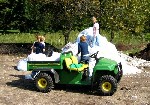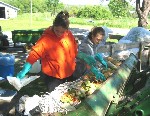News & Events
Field Station Would Look Good in Seattle
Posted on Monday, October 15, 2007
A college friend in Portland, Oregon regularly updates me on eco-events of the Pacific Northwest. He recently sent an electronic page published October 10 in The New York Times that invigorated my spirit for the composting project at Westminster's Field Station.
Here is an excerpt: " . . . Piles of garbage from Seattle are lined up in neat rows . . . What goes in as yard waste and food scraps will emerge two months later as a mountain of loamy compost sold by the bag at garden centers throughout the Pacific Northwest by Cedar Grove Composting. In the process, the waste is ground up, piled up, aerated, dried and sifted. . . The company, the major composter in this area, will soon have much more trash coming its way because Seattle is making food waste yet another mandatory recycling ingredient in its already long list."
Seattle now recycles 44 per cent of its trash, compared with the national average of around 30 per cent. Its goal, city waste management officials said, is to reach 60 per cent by 2012 and 72 per cent by 2025. Recycling of food scraps in Seattle will become mandatory in 2009.
Seattle's Steve Banchero describes their composting as the "cool side of trash, recycling's cutting edge." Kate Krebs, executive director of the National Recycling Coalition, states that "the food-waste issue is the new frontier for recycling advocates. . . It's the next big chunk."
Seattle, according to 2000 census data, had a population of 563,374. New Wilmington's was 2,452. Their piles will be much bigger than ours and we have no data on the percentage of our trash recycled. I am guessing that we are significantly above the national average for general recycling but we haven't yet begun to make a dent with recycling our home kitchen / food-waste. However, I'm also guessing we would be proportionally at par or a bit ahead of Seattle because of the food-waste recycled from Westminster's Sodexho food services (kitchen and dining hall).
According to the U.S. Environmental Protection Agency, in 2005 U.S. residents, businesses and institutions produced more than 245 million tons of mixed solid wastes, known in the trade as MSW. That computes as 4.5 pounds of waste per person per day! Food scraps are estimated to make up 11.9 per cent of this. Each of us contributes about a half pound of food-waste each day! That's the stuff that typically ends up in landfills, never to be recovered as useful organic carbon.
In 2006, we handled 226 tons of compostable "feedstocks" in rows at the Field Station. Of this amount 7.7 tons were food-waste from Westminster's food services and community kitchens and 1.5 tons were shredded paper. These were added to leaves, pondweed from Brittain Lake, wood chips, litter from animal housing cages and manure. In our system, after four months of weekly stirring and eventual screening, this MSW becomes our loamy compost. We determine its nutrient content and its pH. Microorganisms do the work, we do the management. The compost is mainly used to plant trees at the Field Station and to nurture trees and shrubs on Westminster's main campus. Also in the past 12 months significant quantities were given to the Borough for the flowering plants that the Garden Clubs tend on the town square and to the Shenango on the Green to support landscaping there. For comparison and by population, with 226 tons composted a year at the Field Station, Seattle would need to come up with about 52,000 tons of compostables. In both places, solid wastes that otherwise might be trashed are being re-used in a form that makes ecological and economical sense.
With environmental concerns being heard throughout the United States and the world, there will be a growing need for environmental scientists and engineers to manage operations like the Seattle project and Westminster's Field Station! The U.S. Department of Labor states that the employment of environmental scientists is expected to grow about as fast as the average for all occupations through 2014. The demand for these professionals, the Department of Labor says, "will be spurred by public policy and a continued general awareness regarding the need to monitor the quality of the environment."
Translated into "career talk," this means that Westminster graduates who learn skills of compost management, coupled with a solid background in the liberal arts, might end up in Seattle. . . or, we might encourage them to stay in our region and do the work that needs to be done!
Clarence Harms, Director
Field Station




More Stories



